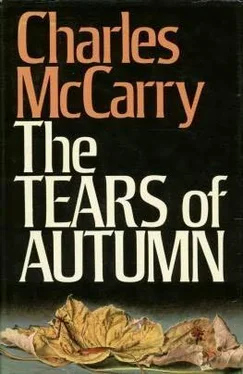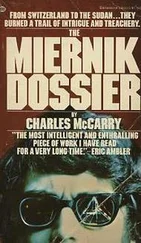They went down a stairway and through a passage with dank earthen walls. Streams of rats whimpered around their feet in the darkness. At the end of the tunnel they climbed another stairway and Nicole rapped at a door. They were let into a dark hall that smelled of incense by a young Chinese. He opened another door, let them go through, and closed it behind them.
The Truong toe, dressed like a peasant in pajamas, sat on a divan; the priest, Jean-Baptiste, crouched on a mat on the floor, with his legs crossed under him and his feet clasped in his hands. Nicole knelt, poured three cups of tea, and handed them to the men. She and the Truong toe spoke to one another in Vietnamese. Christopher understood most of what they said; the Truong toe merely wanted to know if Christopher had come willingly. “He has no fear,” the priest said, “there must be a reason why.” Nicole left the room.
Christopher, leaving his tea untouched, faced the two old men. He supposed they might be sixty, but it was impossible to tell with Asians; one year they were fresh with youth, and the next their skulls came through their flesh as if their corpses were eager to escape into the grave.
“I’m glad to see you safe,” the Truong toe said. “You take chances, going about at night as you do.”
“He takes certain precautions, I’m sure,” the priest said. “Your car is quite all right?”
The priest sniffed loudly and scratched his ribs. His eyes and his voice were clear, and his tic was quiet.
“Last night you asked my cousin, here, certain questions,” the Truong toe said. “I am intrigued to know your purpose.”
“It’s simple. I hope for answers.”
“He has none. Nor do I.”
“Then there’s no purpose in my being here,” Christopher said.
“You didn’t tell me that you knew my relative Nguyen Kim.”
“It didn’t seem important.”
“After you left my house, I tried to puzzle out why you had come to tell me of the death of young Khoi. It made no sense. I concluded you wished to make yourself known to me in a way that would ensure that I’d remember you.”
“My idea seems to have succeeded,” Christopher said. He put his teacup on the table.
“You’ve certainly shown us that you are very direct. Are you working against time?”
“No.”
“Then why,” asked the priest, “do you behave like a man with an incurable disease? Really, it’s very stupid to go about talking as you do and showing yourself as you do unless you care nothing for your life.”
“I’ll be direct again,” Christopher said. “I hoped to shock you into speaking about the things I mentioned to you.”
“You’ve shocked us,” the Truong toe said. He paused, as if reluctant to say something rude. “If you are right in what you think, you must expect that we will kill you. Why, then, come here?”
“Let me ask you this: why waste a gesture, like Nicole in a Paris suit?”
“You know her.”
“You must know I’d have come in answer to a telephone call or a note.”
“And you must know that such things leave traces. An American dining at the Continental with a Vietnamese girl leaves no trace. It’s the sport of the times.”
“Were those your men who followed us across the river?” Christopher asked.
The Truong toe’s eye sockets were filled with shadow; when he turned his face toward Christopher, he showed as little expression as an animal. “Now you waste a gesture,” he said.
“Let me explain something to you,” Christopher said. “What I said to you about Diem was honest-I thought him a great man in his way and I regret his death. I would tell you who killed him, if I knew.”
The priest was scratching his skin now with great violence, as if he was glad heroin had given him this evidence that his nerves were alive. “And in exchange for this worthy intention,” he said, “all you want is for us to confess the murder of an American President and a plan to destroy the American army with heroin.”
“Briefly, yes.”
“Then you’re a fool. What do you think this is-a film? We tell you everything, you escape with the truth, the world is saved. I believe you’re insane.”
“Then you should be frightened,” Christopher said. “We’re alone in this room. You are old. Even if I have no weapon, which is illogical, I could kill you both with my hands before anyone came. You don’t seem to be afraid of that.”
The Truong toe moved his face into the light. “Nothing is gained by this,” he said. “Why exchange these threats?”
“It’s useless,” Christopher said. “I want to ask you a question. If I’m right, and your family arranged such a colossal revenge as the murder of Kennedy, what is the point of keeping it a secret?”
The priest threw his arms wide and began to speak; the tic was moving in his cheek again. He subsided when the Truong toe raised his palm. The Truong toe kept his eyes fastened on Christopher’s face.
The Truong toe said, “Go on.”
“You are the head of the family,” Christopher said. “What do you want for it?”
“That it should continue,” the Truong toe replied.
“No-that it should rule. You had power when Diem and Nhu were killed, and Can was put into prison. How long did it take you to achieve that? The whole length of the family’s life. Are you content to wait another hundred generations for another Diem?”
The Truong toe made a brusque movement of his fingers, as if to summon the words from Christopher’s mouth.
“If you kill a man for revenge, and he does not know why he died, and no one knows,” Christopher said, “then what have you accomplished? Your own emotional release-and what use is that?”
The priest began to reply, but the Truong toe silenced him with another gesture.
“Say what you mean,” the Truong toe said.
“I mean you have everything to gain and nothing important to lose by letting yourselves be identified as the assassins of Kennedy.”
The priest had begun to sweat and tremble. He reached into his pocket with a fluttering hand and produced an envelope of heroin. With his eyes fixed on Christopher, he drew the white powder into his nose. After a moment he was quiet again.
The Truong toe returned his attention to Christopher. “That’s certainly a novel idea,” he said, his dry lips opening in a faint smile.
“It’s logical,” Christopher said. “To complete the act, you must be discovered. There may be a certain elegance in killing an American President with ignominy-using a man who appears to be a lunatic so that the assassination will be regarded as a bit of random madness. But it accomplishes nothing.”
“Accomplishes nothing? The man is dead.”
“But not his policies. When Diem was killed, he and Nhu were desperate to end American influence in Vietnam. They had no chance. But you do. Let it be known that Kennedy was shot in Dallas in revenge for the death of Diem and Nhu, and there will be such revulsion in the United States against Vietnam that you won’t see an American face in your country, or an American ship in your harbors, for a generation to come.”
The Truong toe flicked open his clenched hand as if releasing a bird into flight. “You’d give this country to the Communists?”
“Why not?” Christopher said. “Diem and Nhu were prepared to do so. At least the Communists are Vietnamese. Some of them are members of your family.”
The Truong toe relaxed on his divan, steepled his fingers, tapped their ends together. The priest spoke to him in rapid Vietnamese. Christopher watched the Truong toe’s impassive features and the priest’s face, one side of it as unreadable as the Truong toe’s and the other side in spasm. “Kill him tonight, in the street, anywhere,” the priest was saying. “No, he can do no harm,” the Truong toe replied. Christopher realized the old man knew he understood Vietnamese.
Читать дальше












